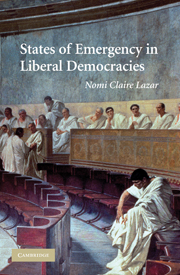Book contents
- Frontmatter
- Contents
- Acknowledgments
- States of Emergency in Liberal Democracies
- 1 The Problem of Emergency
- 2 Must Exceptionalism Prove the Rule?
- 3 Two Concepts of Liberalism
- 4 Are Rights Derogations Always Wrong?
- 5 The Rule of Law and the Roman Dictatorship
- 6 The Norms of Crisis Government
- Bibliography
- Index
1 - The Problem of Emergency
Published online by Cambridge University Press: 15 September 2009
- Frontmatter
- Contents
- Acknowledgments
- States of Emergency in Liberal Democracies
- 1 The Problem of Emergency
- 2 Must Exceptionalism Prove the Rule?
- 3 Two Concepts of Liberalism
- 4 Are Rights Derogations Always Wrong?
- 5 The Rule of Law and the Roman Dictatorship
- 6 The Norms of Crisis Government
- Bibliography
- Index
Summary
Tensions between order and justice are inherent in any constitutional regime. Order requires constraint and justice suggests rights and freedoms. While the everyday struggles between these two values often escape our notice, they clash spectacularly in times of emergency. Nurtured in security and stability, contemporary liberal theory, in the absence of an immediate crisis, has been mostly silent on this subject. Nonetheless most liberal democracies have standing constitutional or special legal powers to derogate rights and the rule of law for the sake of order in times of crisis; and when a crisis arises, those states that do not have such powers use impromptu ones anyway. This is no ivory tower puzzle, and these powers are exercised more often than we think. This book aims to help theory touch its feet to the ground.
Given that liberal democracy is essentially bound up with the division of powers and the preservation of rights and freedoms, how could emergency powers, which impose order through constraint of these features, ever be justly constituted and exercised? How can liberal democratic values accommodate powers or institutions that seem inherently illiberal? And, given that emergencies are common and often unpredictable, how can a liberal democratic state survive without them? On the one hand, in resorting to such powers the state ceases to be liberal, while on the other, in not resorting to them, the state might well cease to be. At a minimum, failing to effectively confront a crisis results in a significant loss of life and property.
- Type
- Chapter
- Information
- States of Emergency in Liberal Democracies , pp. 1 - 18Publisher: Cambridge University PressPrint publication year: 2009

